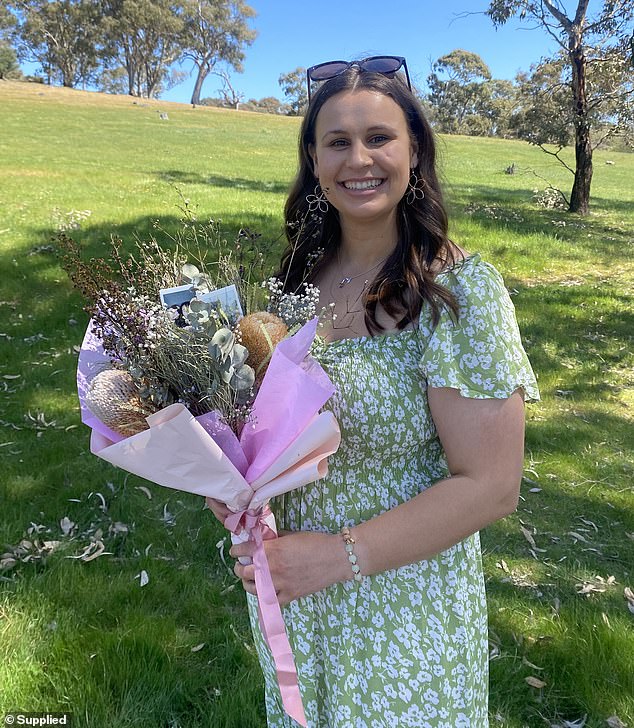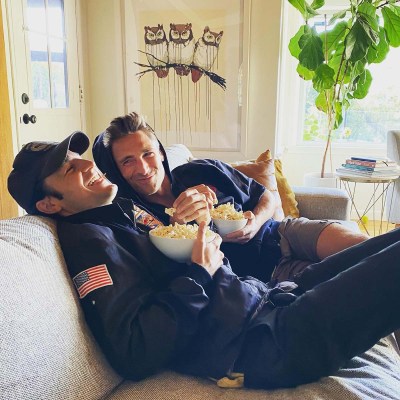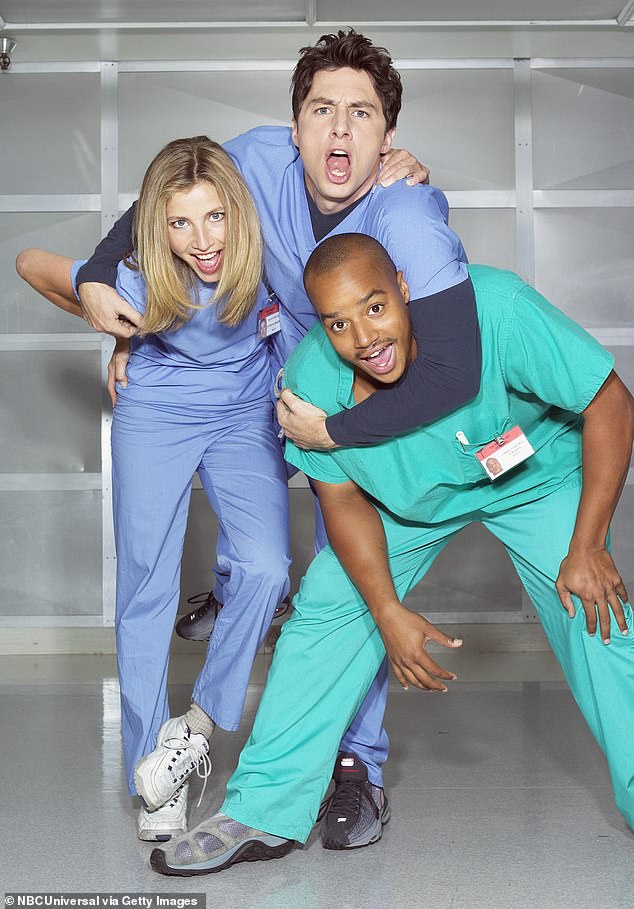When 16-year-old Tessa McHugh brushed shoulders with a classmate during a casual game of school sport, she didn’t think twice about it.
‘It was just a little bump,’ the now-25-year-old, from Adelaide, told FEMAIL.
‘But the pain in my shoulder wouldn’t go away.’
What started as a dull ache soon became something far more serious. The initial bump had highlighted a sinister growth lurking in her body.
‘I mentioned it to Mum in passing and she felt a large lump on my shoulder blade,’ she recalled.
A routine GP visit quickly turned into a series of scans and tests. Within two weeks, doctors delivered devastating news: Tessa had stage-two chondrosarcoma, a rare and aggressive form of bone cancer.
‘I’d never even heard of sarcoma, let alone chondrosarcoma,’ she said.
‘It was confronting and distressing to hear that at 16.’

When 16-year-old Tessa McHugh brushed shoulders with a classmate during a casual game of school sport, she didn’t think twice about it

A routine GP visit quickly turned into a series of scans and tests. Within two weeks, doctors delivered devastating news: Tessa had stage-two chondrosarcoma
Unlike other cancers, chondrosarcoma is notoriously resistant to chemotherapy and radiotherapy.
The only treatment is surgical removal of the tumour, and in Tessa’s case, it wouldn’t just be one operation.
Just six weeks after her diagnosis, she underwent her first surgery at Adelaide’s Women’s and Children’s Hospital.
Surgeons performed a subtotal scapulectomy, removing a large portion of her shoulder blade and surrounding muscle.
‘The pain was a persistent ache,’ she said, ‘and it affected how much I could move my arm.’
But that was just the beginning.
Complications followed the initial surgery, and Tessa underwent two more operations to manage damage from the invasive procedure.
And then came the unthinkable: the cancer returned. Not once, but three times.

Just six weeks after her diagnosis, she underwent her first surgery at Adelaide’s Women’s and Children’s Hospital (pictured at the time)

Tessa celebrating being five years in remission from cancer with her family
Each time, it was discovered during routine scans. This meant going back into hospital and preparing for yet another surgery.
Between January 2016 and March 2018, Tessa endured six major surgeries, spaced just months apart.
‘There were definitely lots of moments when I was really tired and frustrated,’ she said.
‘I’d just heal from one surgery, and then I’d have a scan that showed another tumour.’
Despite the emotional toll, she never hesitated to continue treatment.
‘Knowing that surgery was my only option, I just had to keep going,’ she said.
While many teenagers worry about exams and friendships, Tessa was navigating hospital corridors and post-op recoveries. But school became her anchor.
‘School was something normal while all of these medical things were happening,’ she explained.
‘It gave me a sense of consistency. I actually enjoyed going when I was able.’
Teachers and friends rallied around her, and her close-knit family were by her side every step of the way.
‘My mum, dad, older brother and uncle – who is a medical professional – were my biggest supports,’ she said.
‘They were always there for appointments and helped out when my arm was in a sling.’

It’s now been nearly a decade since her diagnosis, and Tessa has learned to live with the long-term effects of her surgeries
It’s now been nearly a decade since her diagnosis, and Tessa has learned to live with the long-term effects of her surgeries.
‘I can’t really lift my arm above my head,’ she said.
‘So a lot of over-the-shoulder movements are out. But I focus on what I can do, not what I can’t.’
She’s careful not to overstrain herself, adjusting her daily routine to suit her physical limits.
‘The human body is amazing,’ she reflected. ‘I’ve adapted.’
Growing up, she was an avid horse rider – a passion that had to be put on hold.
‘After surgery, there’s always a long recovery period. I had to be really mindful about healing before doing anything too active.’
But throughout her recovery, nature and animals became a source of comfort. Living on a large property, Tessa found peace in the outdoors.
‘I’ve always been connected to nature. Spending time with my pets and being outside was really important for my mental health.’
That deep connection to healing eventually shaped her future. Today, she works as a provisional psychologist, helping others navigate trauma and hardship.
‘Cancer doesn’t define who I am,’ she said.
‘But it has shaped my perspective and values. Going through it during adolescence – when you’re still figuring out who you are – has had a huge impact.’

Growing up, she was an avid horse rider – a passion that had to be put on hold
Though she’s in remission, Tessa continues to have yearly scans. She’ll reach her 10-year milestone in 2028, after which regular checks will stop. Until then, the fear of recurrence still lingers.
‘The anxiety that it’s going to come back is very real,’ she said. ‘Because it already did – three times.’
And while she’s been told the tumour may have been growing for up to nine months before diagnosis, there were no warning signs until that fateful bump at school.
‘I had no idea anything was wrong,’ she said.
‘It just felt like a sore shoulder.’
Tessa hopes her story encourages others to listen to their bodies and seek help when something doesn’t feel right. She also wants young people going through cancer to know they’re not alone.
For Tessa, that strength was forged through pain, persistence, and the love of family, nature, and community.
She may not lift her arm above her head anymore, but she holds her head high.
In line with Sarcoma Awareness Month (July) ANZSA is calling on people to register for The Great Sarcoma Plankathon, a national fundraising event to support sarcoma research by planking for 60 minutes across the month.
Funds raised through the Plankathon will go directly towards sarcoma research and clinical trials co-ordinated by ANZSA, with the aim of improving survival rates and quality of life for those diagnosed.








